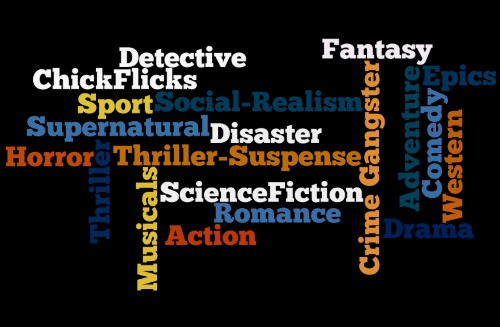
What do you do after you suddenly find yourself bored with the one thing that used to give you so much joy — screenwriting?
It happens. In fact, it's a guarantee that at some point — or multiple points — in your screenwriting journey, whether you're striving to break through and become a professional screenwriter or you've broken through and managed to carve out a screenwriting career, you're going to find yourself bored with what you do.
This isn't Writer's Block.
Read ScreenCraft's 7 Reasons Why “Writer’s Block” is BS!
This is a time in your journey when you find yourself staring blankly at that screen, going through your routine, and just wishing you had something better to do.
The life of a screenwriter is wrought with rejection, indifference, and a whole lot of waiting for lightning to strike — whether it's through contest and fellowship submissions, cold queries, or that endless networking you've put yourself through as you try to get someone to care enough about your scripts to make a deal or connect you with someone to make a deal for you. It's a grind.
And that grind shuts down your creative engine within as that voice in the back of your mind begins to ask questions like:
- Why are we doing this?
- What are we getting from this?
- Who is going to ever read this?
- When is anyone going to finally return my emails?
- Where will any of this take me?
It happens to the best of us. You may only be a couple of years in as a writer trying to make it or you may be a decade in with a couple deals here and there. Heck, there are top one-percent professional screenwriters out there that get bored with their work.
Regardless of who you are and where you are in your screenwriting journey, here are five ways to break those boredom chains and get yourself excited about creating worlds and characters again.
1. Change Your Writing Routine
Writers are often creatures of habit. Some love to write in the comforts of their own home, in their favorite chair, while sitting next to their favorite pet. Others like to write in their favorite libraries, coffee shops, or book stores.
Read ScreenCraft's The Best Place in the World for Screenwriters to Write!
It's great to have your routines, but when you chain yourself to the same place for hours on end and for years on end, it's only natural that your mind is going to start to wander and your creative juices aren't going to be flowing as much as they used to.
If you normally write in the comforts of your home, get out and find a place far from it.

Coffee shops and libraries offer an energy that your own dorm room, apartment, or house don't offer. You can still escape into the worlds of your stories. Just close yourself off with headphones, some good writing music, and a little tunnel vision.
Read ScreenCraft's How to Use Music to Write Better Screenplays!
If you have a regular haunt outside of your home, try a new place.
Sometimes it's as easy as changing your location to get that imagination going.
And sometimes it can be about changing the routine of your writing process as well. If you always outline before writing a script, try going in blind. If you never outline, try doing that prep work before you start writing.
Changing your routine could be all that it takes.
2. Tackle a New Genre
Complacency is the creative mind's poison. It will shut down all of your creative systems once the storage has been exhausted.
Even if you've become known for a particular strength in your writing, even if you've mastered that strength to the point where your writing stands out from the rest because of it, you can still find yourself bored. And when that poison of complacency causes that boredom, it will slowly eat away at any creative juices you have for writing.
Just because you're good at something — or worse yet, comfortable with something — doesn't mean you'll be sustained doing it for an extended period of time.
Try tackling a new genre. A genre you've never written in before.

If you're the action guy, write a drama. If you're the drama girl, tackle some action. And you can also have the best of both worlds by taking what you know and love in whatever genre you've been writing in and applying it to another to create an amazing hybrid — Character-Driven Action, Action Comedy, Horror Comedy, Adventure Romantic Comedy, Sci-Fi Drama, Sci-Fi Horror, etc. Blend it all together. That way you're challenging yourself but still using the tool box you've built throughout the years.
But if you're in need of a real jump start, go with a single genre that you've never written under. Something that shakes your system up. Something that intimidates you.
3. Take Time Off to Feed Your Brain
Sometimes the reserves of your creative mind go empty — and then all that you need is a little time to fill them up again. When you get juice back into those tanks, the boredom is extinguished.
But how do you fill those tanks back up?
Take a week or two to watch movies or binge a TV series. If you have a project that you've been planning to write, immerse yourself in that genre. Watch whatever film or series you can within that genre. Inspiration will come. And it will come especially fast when those tanks are empty because your creative mind will be hungry for any little morsel of imagery, concept, or inspiration.
Go to the movie theater more often than you would. Take a day off and go to a couple of matinees.

The movie theater is still a magical place — and the earlier in the day you go, the less distractions there will be around you.
Sure, you can stream any movie on the planet in the comforts of your own home — and you should do that as well — but there's something about the movie theater that's different. Use that magic.
You can even pick up a new book to read an hour before you go to sleep each night.
Watching movies, watching shows, and reading books feeds your creative mind. It fills those empty tanks. The smallest details you intake can blossom into full-fledged ideas and concepts that you can bring to your own writing.
Read ScreenCraft's 5 Habits to Get Those Creative Juices Flowing!
4. Give Yourself an Intimidating Deadline
Nothing breaks the monotony like a good old intimidating deadline — a proverbial ticking time clock always reminding you to stay engaged.

Professional screenwriters know that industry deadlines are tough.
For features, you generally get 10-12 weeks to complete a first draft while on assignment. And that first draft has to be as good as what you would normally consider a final draft. So that's roughly three months to write a final draft.
For television episodes, it's even more intimidating. You generally get a week to write one single episode — one week. Sometimes less.
When you give yourself these seemingly harsh deadlines and discipline yourself to stick to those deadlines, your creative mind is forced to adapt or die.
Read ScreenCraft's Are You Truly Prepared for Success as a Screenwriter?
When you're writing on your own — on spec — with no deadlines to answer to, you get complacent. Since there is no one looking over your shoulder, it doesn't matter what you churn out in three months, six months, or a year. There are no ramifications. That's what can cause you to get bored. And all too often, that is what screenwriters call Writer's Block. It's not Writer's Block — it's you being complacent and that complacency causes the boredom. The boredom causes you to be disengaged from your writing. When you're disengaged from your writing, your creative mind isn't connected enough to offer answers to story and character issues you'll surely be struggling with.
So give yourself a hard deadline. Sometimes that's the only kick in the butt you need to snap out of the boredom.
5. Write the Script That Scares the S*** Out of You
You know, the one you've had in the back of your head that you have constantly pushed back further and further and further because you're too scared to take it on. The one that is going to take a lot of research and resources to write. The one that is going to take a lot of emotional struggle to finish. Whatever the plight is, it's time to take it on.
In interviews with the greatest actors, the one common thing they usually have to say is that they love to take on the roles that scare them the most. And those roles are usually the ones they are nominated for.
Screenwriters need the same type of challenge.
Don't cheat yourself out of what could be your greatest work. If it scares you, that's the script that can break you out of this prison of boredom.
Now here's a bonus for you!
6. Maybe It's Time to Forget the Rules and Guidelines
Screenwriters get so caught up in the rules and regulations that they read about in blogs, guru books, guru seminars, podcasts, and interviews with big screenwriters and major industry power players.
Even the general guidelines and expectations can tangle webs that screenwriters feel stuck within.
You're told not to write in this genre or that genre. You're told this genre and that genre are dead. You're told to follow this formula or that formula. You're told to put this plot point on this page and that plot point on that page.
You're being told to do a lot of things, many of which can contradict the other.
Maybe it's time to forget all of that sh!t and just write what you want to write, how you want to write it.
Forget about the rules, the directives, the guidelines, the expectations, and even the industry advice. Maybe it's time to just write one for you — and write it in a rebellious "I don't give a sh!t" way.
Write one for you.
So if you're finding yourself bored with something that you normally love to do — take notice and find a way to shake things up and refuel those tanks.
Change your routine by finding a new place to write and by trying a new writing process.
Tackle a new genre that you've never written in before, either by applying what you know, love, and are good at to a new genre or go full force by trying a genre you've never attempted.
Take time off to watch movies and shows. Find a great book that will allow your mind to escape. If you're preparing to write in a certain genre, immerse yourself in that genre to feed that creative mind of yours.
Give yourself intimidating deadlines. When you abide by the general tight industry deadlines (three months for a feature final draft and one week for a series episode), not only are you waking yourself up from that stupor, you're also training yourself for when you do succeed and are forced to write under their deadlines.
Take on a script that's been scaring you. The one you've always had in the back of your head. Your best writing usually comes forth when confronted by an opposing force — be it a deadline or a script you've been too scared to take on.
And then finally, through all of the rules and regulations that you have been bombarded by and write something for you — your way.
Ken Miyamoto has worked in the film industry for nearly two decades, most notably as a studio liaison for Sony Studios and then as a script reader and story analyst for Sony Pictures.
He has many studio meetings under his belt as a produced screenwriter, meeting with the likes of Sony, Dreamworks, Universal, Disney, Warner Brothers, as well as many production and management companies. He has had a previous development deal with Lionsgate, as well as multiple writing assignments, including the produced miniseries Blackout, starring Anne Heche, Sean Patrick Flanery, Billy Zane, James Brolin, Haylie Duff, Brian Bloom, Eric La Salle, and Bruce Boxleitner. Follow Ken on Twitter @KenMovies
For all the latest ScreenCraft news and updates, follow us on Twitter, Facebook, and Instagram.
Tags
Get Our Screenwriting Newsletter!
Get weekly writing inspiration delivered to your inbox - including industry news, popular articles, and more!



























